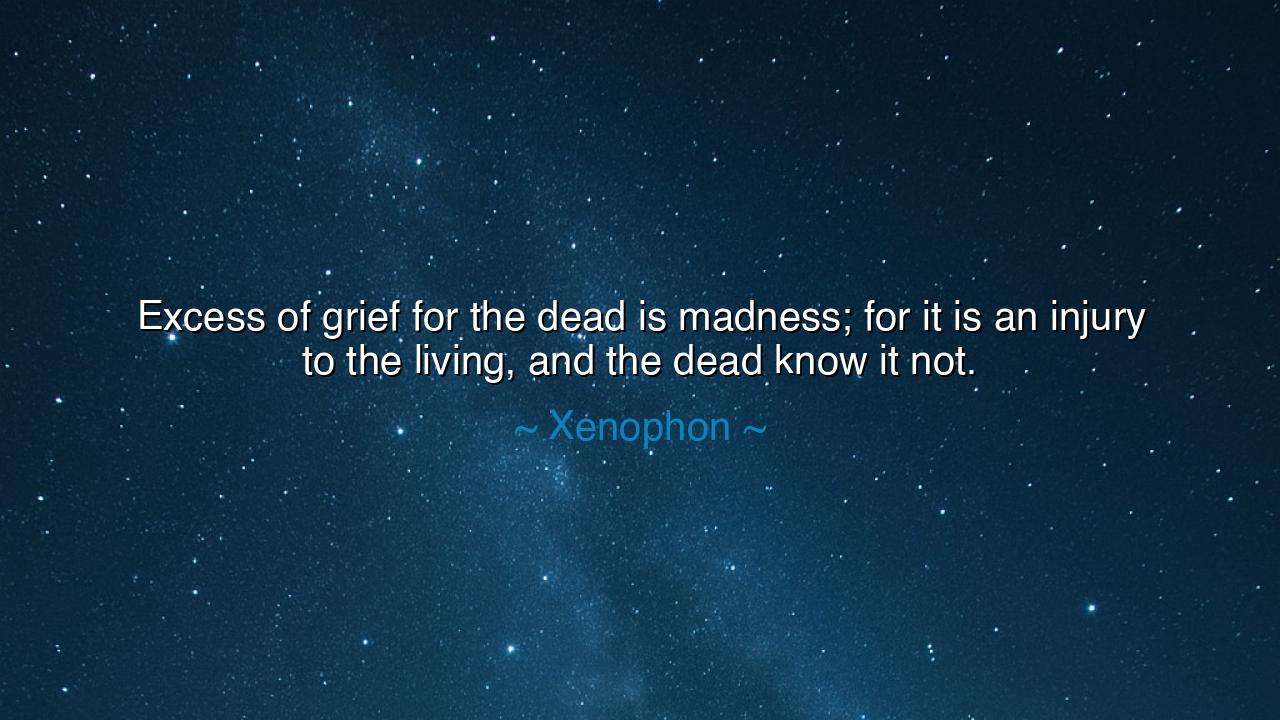
Excess of grief for the dead is madness; for it is an injury to
Excess of grief for the dead is madness; for it is an injury to the living, and the dead know it not.






"Excess of grief for the dead is madness; for it is an injury to the living, and the dead know it not." — Xenophon. In these words, Xenophon, the ancient philosopher and historian, speaks to the delicate balance between grief and the need to honor the living. To grieve is natural, a reflection of our love and respect for those we have lost, but excessive grief, he warns, leads us down a dangerous path. Grief in moderation is a tribute to the deceased, but when it overflows into madness, it becomes an injury to those still among us, to those who are waiting for us to embrace life once more. The dead, in their final peace, know nothing of our suffering, yet we burden ourselves and others by holding on to sorrow too long.
This teaching finds resonance in the tales of the ancient Greeks, who understood the fine line between mourning and madness. Achilles, the greatest of the Greek warriors, offers a poignant example. After the death of his dear friend Patroclus, Achilles was overcome by grief so intense that it led him to actions of great fury and violence. His sorrow consumed him, leading him to dishonor the body of Hector, his enemy. In his grief, he lost sight of what truly mattered—his honor and the very things he had once fought to protect. Xenophon would likely have seen this as an example of how grief, unchecked and excessive, can cloud one’s judgment and cause harm to both the living and the deceased. For Achilles, his sorrow was a form of madness, one that dragged him into a cycle of destruction.
The ancients were wise in their understanding of balance. In Plato's Phaedo, Socrates, at the time of his death, spoke of the nature of death and the grief of his followers. He encouraged them to focus not on the sorrow of his passing, but on the wisdom he had shared, the legacy he had left behind. Socrates did not indulge in excessive sorrow; instead, he accepted death with the grace of one who understood that to mourn endlessly would only hinder the living. His teachings, his words, and his spirit were his true legacy—not the mourning of his body. Xenophon’s wisdom aligns with this: the grief for the dead must not become a barrier to the lives of the living.
In Roman culture, we find similar sentiments expressed in the writings of Cicero, who, after the death of his beloved daughter Tullia, wrote about the nature of grief. Though deeply sorrowful, he understood that life must continue. His grief was intense, but it did not overwhelm him. Instead, he acknowledged the pain, but also recognized the importance of moving forward, of living in a way that honored the memory of the departed without allowing that sorrow to destroy his spirit. Cicero’s words echo Xenophon’s wisdom—grieving is a natural part of human existence, but to grieve without end is to disrespect both the deceased and those who remain.
In our own lives, Xenophon’s message is clear: while grief is inevitable, we must not let it consume us. Excessive grief not only harms our own well-being but also affects those around us, drawing them into a cycle of sorrow that leaves little room for the joy and vitality of life. Consider the example of those who have suffered great personal loss yet have gone on to live lives of purpose and service. They channel their grief into meaningful actions, into helping others, into keeping the memory of the deceased alive in a way that honors their legacy, rather than drowning in sorrow. Grief, when embraced in balance, can become a source of strength, a force that propels us forward, teaching us to cherish life more fully.
The lesson here, then, is one of balance and wisdom. When we face loss, let us allow ourselves to grieve, but let us not become trapped by that grief. Let us remember that the dead know it not, and that it is the living who need our care, our love, and our strength. Let us honor the deceased by living lives that are full, that reflect the lessons and love they left behind, rather than being consumed by the void they have left. Xenophon’s insight teaches us that it is the living who need our attention now. In this, we find the true path to healing.
Thus, when sorrow visits you, mourn, but do not let it rule your soul. Let it be a moment of reflection, a tribute to those you loved, but never allow it to steal the joy and vitality that life offers. The dead may rest in peace, but those of us who remain must live fully, embracing the future with open arms, just as they would have wished for us. Xenophon shows us that the way to truly honor those we have lost is not through endless sorrow, but through lives well-lived, marked by resilience, gratitude, and the strength to carry forward the lessons of the past.






AAdministratorAdministrator
Welcome, honored guests. Please leave a comment, we will respond soon